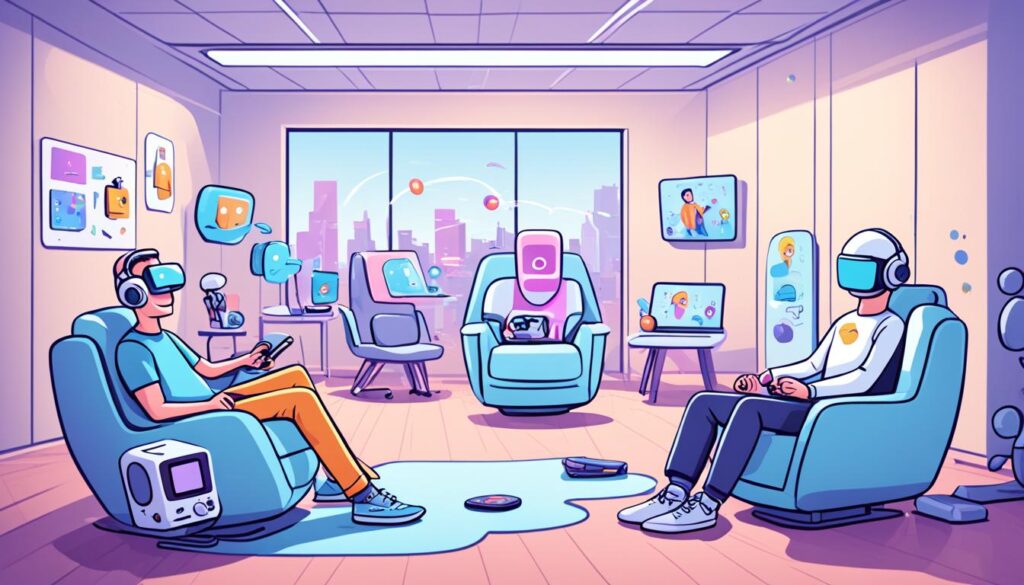South Korea has launched a special project. They’re sending 7,000 AI robot dolls to seniors who live alone. This project shows how tech is fighting loneliness, especially among the elderly. With many people feeling lonely and isolated, these robots offer a new way to find comfort and support.
AI companions can help with feelings of loneliness and anxiety. They’re designed to understand and relate to you emotionally. They are able to have meaningful talks with you, play music, and even remind you to take your medicine. For older users, they can also keep an eye on health and safety.
But there are also some worries. What if people start to rely too much on these AI friends? Could they take the place of real-life relationships? There are also big concerns about how your data is used and kept safe. Despite these issues, AI companions clearly have a big role in improving mental health.
These AI helpers could change the way we handle mental health issues. They offer a new path for those dealing with loneliness and other emotional struggles. By helping with these problems, technology like this really does make a difference.
Introduction to AI Companions for Middle-Aged Solitude
Artificial intelligence (AI) technology has opened doors to new ways of fighting loneliness among middle-aged people. These AI companions are like virtual friends, using emotions to have chats with their users. This not only helps people feel less alone but also gives them someone to talk to.
A research by Shishehgar, Kerr, and Blake (2019) showed that older adults get a boost from robotics. It found they had positive results on their lives. A separate study in Taiwan, done by Chiu, Hsieh, Li, et al. (2021), stresses the importance of knowing what middle-aged folks want in AI companions or pets.
Another study, carried out by Zsiga, Tóth, Pilissy, et al. (2018), looked at how a robotic companion could help single, older people at home. It found that it brought serious advantages for their emotional well-being. In line with this, Abbott, Orr, McGill, et al. (2019), found that robot pets made care home residents feel better.
Loneliness is a major health problem; 36% of American adults face serious loneliness. It doesn’t just make people feel sad; it can also lead to heart issues, depression, and anxiety. A 26% higher risk of early death is linked to feeling lonely for a long time.
The work of Bemelmans, Gelderblom, Jonker, and de Witte (2012) highlights the power of social robots in caring for the elderly. Their findings support AI companions as a way to improve life for those in middle age. These robots offer valuable social contact and friendship.
Emotional Support and Empathy Provided by AI Companions
In today’s digital age, AI chatbot personas are changing how we fight loneliness. They offer an empathetic presence. This allows people to share their thoughts and feelings freely. Replika, a popular AI app, has around twenty million users worldwide. This shows how much comfort these virtual friends bring, especially to those in middle age.
Xiaoice in China has won over 660 million hearts. People turn to this AI to feel less lonely. These chatbots remember what you’ve said before. So, they talk to you in a way that feels personal. This makes their virtual friendship feel real, creating a sense of being heard and understood.
Around 75% of Replika users are men. They find in these AI companions a source of support that doesn’t judge. Whether it’s helping with depression, learning a new language, or just being there to listen, these AI friends are making a big difference. Sharing with them and getting understanding responses can bring positive changes to how we feel inside, studies show.
And there’s more. Reports suggest that these virtual friends can help with mental health. They might even help with online social anxiety. A study on 618 students in China found that talking to virtual companions lessened their fears of socializing online. This shows that these AI friends can really help.
As they get smarter emotionally, AI friends like Replika and Xiaoice do more than just chat. They’re becoming important for helping us deal with feeling lonely. In today’s world, they’re more than digital tools. They’re friends that understand us in ways that matter.
AI Companions and Social Anxiety
AI companions have become important in helping people with social anxiety. They provide a virtual practice ground to boost social skills. These virtual friends understand emotions and have meaningful talks with users. This helps those with social anxiety feel more confident and improve their social life.
Overcoming Social Anxiety Through AI Companions
For people battling social anxiety, AI friends offer a safe space for conversation practice. With time, users become more self-assured and less anxious around others. These companions are always available, offering steady support in social settings.
Forming Meaningful Connections with AI Support
Establishing connections is tough for those with social anxiety. AI pals act as a reliable, stress-free support. With their understanding and tailored chats, they help users gain social skills and feel more at ease.
Mental Health Monitoring and Safety Features of AI Companions
Technology is not just about gadgets. Today, it’s helping seniors with their mental health and keeping them safe. AI companions are at the forefront of this mission. They offer many features to watch over health and give quick help in crises. Let’s explore how these digital friends are making a difference.
Detection of Falls and Health Concerns
AI friends are great at spotting falls and health worries. Technology can assist with mental health, a problem facing one in three worldwide. Seniors, especially, benefit from this lifesaving tech. AI uses smart algorithms to notice health changes fast. It then alerts the right people, like caregivers or doctors, to step in.
Ensuring Safety and Well-Being for Seniors
Seniors on their own find great help in AI companions. These tools keep an eye on health and jump in when help is needed. With more than a third of disability years caused by mental issues, prevention is key. These digital pals can help track feelings and offer mental health advice. Apps like Woebot and Tess are there for therapy and emotional help. They cut down on depression and stress, making life better. For seniors and their families, it’s a relief knowing someone is caring for them.
As AI companions grow, they’re more important than ever for seniors’ health. With their mix of health checks, mental health care, and safety watching, they’re changing lives.
Cautions and Concerns with AI Companions
AI companions are evolving quickly. They have gone from simple conversations to complex interactions. This growth offers huge benefits but also raises big concerns. It’s crucial we tackle these issues for safe and balanced AI use in our daily lives.
Potential for Addiction and Impact on Real-Life Relationships
AI companions are now our teachers and emotional rocks. They greatly affect our lives. But there’s a real risk of getting addicted to the comfort they provide. This can hurt our real-life relationships. If we start to prefer AI’s judgment-free and always-ready company, our connection with people weakens. This can change how we socialize, and not in a good way.
Privacy and Security Issues
A major issue with AI friends is privacy and security. They deal with our sensitive info, so *protecting personal data* is a must. The tech behind these AI entities is smart. It learns about our emotions and responds to them. But, this means that what we share with them is saved. It could be conversations or our actions.
Keeping this data safe from hackers is vital. It helps keep users’ trust and safety intact.
These AI friends are becoming a big part of our lives. Figuring out how to enjoy their benefits without the risks is key. AI companions are great, but we must be careful. They should make life better, not worse.
Benefits of AI Companions in Solitude
AI companions are a new way to help with loneliness, especially for older people. In South Korea, over 7,000 AI robot dolls are being used to fight this problem. They use advanced tech to talk and understand your feelings. This tech helps people feel less alone.

These AI friends can have smart, personal chats with you. They are made easy to use, even for those not good with technology. Their talks provide deep support and understanding, which is super important for your feelings.
Emotional Intelligence and Personalized Conversations
*Emotional intelligence* is key for AI companions. They remember what you’ve told them, which makes you feel truly heard and appreciated. This special way of chatting lets the AI give very targeted help, which is great for those who are lonely.
Providing Non-Judgmental Support and Understanding
AI friends give you a safe space to talk without feeling judged. You can share your feelings openly with them. This feature is really good for people who find it hard to talk to others or who feel anxious around people.
Overall, AI companions make a big difference in the lives of those dealing with loneliness. Their unique emotional support and personal talks make them essential for people left feeling alone in today’s world.
The Role of AI Companions in Mental Health Support
AI companions are now offering key support for mental health. They provide ways for people to cope with anxiety and depression. By giving a safe place for sharing feelings, they offer support and advice.
Coping with Anxiety and Depression
These AI companion apps act as friends for those feeling alone. They can help keep track of mental health, especially for older people. Studies show that being lonely can be really bad for your health, leading to risks like heart diseases and depression. AI friends lessen these risks by being there always, so dealing with anxiety and depression gets easier.
Limitations of AI Companions in Therapy
AI friends are good at providing some help, but they’re not enough for big mental health issues. Serious depression or bad anxiety needs a real therapist. There’s also a worry about becoming too dependent on these digital friends, which can be bad for real-life relationships.
Experts like Professor Prescott warn that using them too much might not be ideal. It’s important to combine AI support with traditional mental health care. This approach makes sure people get all the help they need.
Privacy and Ethical Concerns with AI Companions
AI companions like Replika and CarynAI are getting more popular. But this popularity brings up important privacy and ethical issues. Replika has about twenty million users across the globe.
The dangers of data breach, manipulation, and keeping users safe are real.

Risks of Data Breaches and Manipulation
Users worry a lot about their data being breached by AI companions. The subreddit r/replika, with over 70,000 fans, has many complaints. People say you need to retrain the AI and sometimes it acts strange.
When these AI models have big updates, they sometimes don’t work well. More than 100 model versions were tested before being broadly used. This shows how complex and fragile these AI models can be.
Ethical Considerations for User Protection
It’s very important to have ethics in place to protect users from AI companions. CarynAI made $100,000 in a week and might reach $5 million monthly. This shows their big impact and power.
There’s a big difference in power between users and the companies behind these AI companions. Places like Forever Voices need to have strong rules. These rules should keep personal info safe and make users feel they can trust these services with their data.
Best Practices for Using AI Companions
AI companions can bring lots of benefits. But to really enjoy them, you need to play by the rules. Here are some tips to guide you:
Establishing Clear Boundaries with AI Companions
Setting boundaries is key to not rely too much on AI friends. They should support you, not lead your life. Talk to them at certain times every day. This keeps things in balance.
Prioritizing Real-Life Human Connections
AI friends can be emotionally supportive. But they shouldn’t take the place of real people. It’s crucial to spend time with family and friends face-to-face or by voice. This helps keep your real bonds strong.
Reflecting on AI Relationship and Well-Being
Thinking about your AI bond can be good for your mental health. Ask yourself if it makes you happier. Or if it stops you from enjoying real life. This helps keep everything in check.
Understanding Privacy Policies and Informed Usage
Knowing about privacy is important for keeping your info safe. Learn what your AI friend does with your data. Read their privacy policies well. If privacy worries you, adjust your settings or look for other options.
With clear boundaries, a focus on real connections, reflection on your AI bond, and awareness of privacy, you can use AI friends to feel better. And do so in a safe way.
Conclusion: Embracing AI Companions for Mental Health Support
Technology is changing how we look at mental health care. AI now offers new ways to deal with loneliness and mental health problems. These AI friends are designed to be caring and understanding. They give personal attention and listen without judging. This can be really helpful for those who feel lonely in the middle of their lives. It opens up a new way to get support that is easy to reach.
AI friends can make therapy better and give instant support. But, they are not a replacement for talking to a real person. It’s smart to be careful about how much you share with them. Be sure to set clear rules about what you share and how much you rely on them. This helps keep your real-life relationships healthy.
It’s good to think about how AI friends are affecting you. Learning about privacy rules can help you use them safely. Used right, they can really improve the therapy experience. They fill in gaps in mental health care, making it better for you.
Source Links
- https://www.linkedin.com/pulse/ai-companions-new-approach-combat-loneliness-among-seniors-borish-l3pcc
- https://www.ncbi.nlm.nih.gov/pmc/articles/PMC10949182/
- https://www.ncbi.nlm.nih.gov/pmc/articles/PMC8593639/
- https://www.thailandmedical.news/news/ai-companionship-a-remedy-for-loneliness-and-mental-health-support
- https://mit-serc.pubpub.org/pub/ai-companions-eu-law
- https://www.ncbi.nlm.nih.gov/pmc/articles/PMC10906104/
- https://wellnessafter55.com/middle-aged-solitude-ai-companions-and-their-therapeutic-potential
- https://www.ncbi.nlm.nih.gov/pmc/articles/PMC10906104
- https://www.ncbi.nlm.nih.gov/pmc/articles/PMC10911327/
- https://www.ncbi.nlm.nih.gov/pmc/articles/PMC10730549/
- https://www.wokewaves.com/posts/rise-of-ai-companions-human-robot-relationships
- https://www.datasciencecentral.com/will-ai-offer-human-companionship-and-mental-health-benefits/
- https://www.rollingstone.com/culture/culture-features/ai-companion-dating-emotional-privacy-risks-1234735519/
- https://wellnessafter55.com/middle-aged-solitude-ai-companions-and-their-therapeutic-potential/
- https://itrexgroup.com/blog/ai-mental-health-examples-trends/
